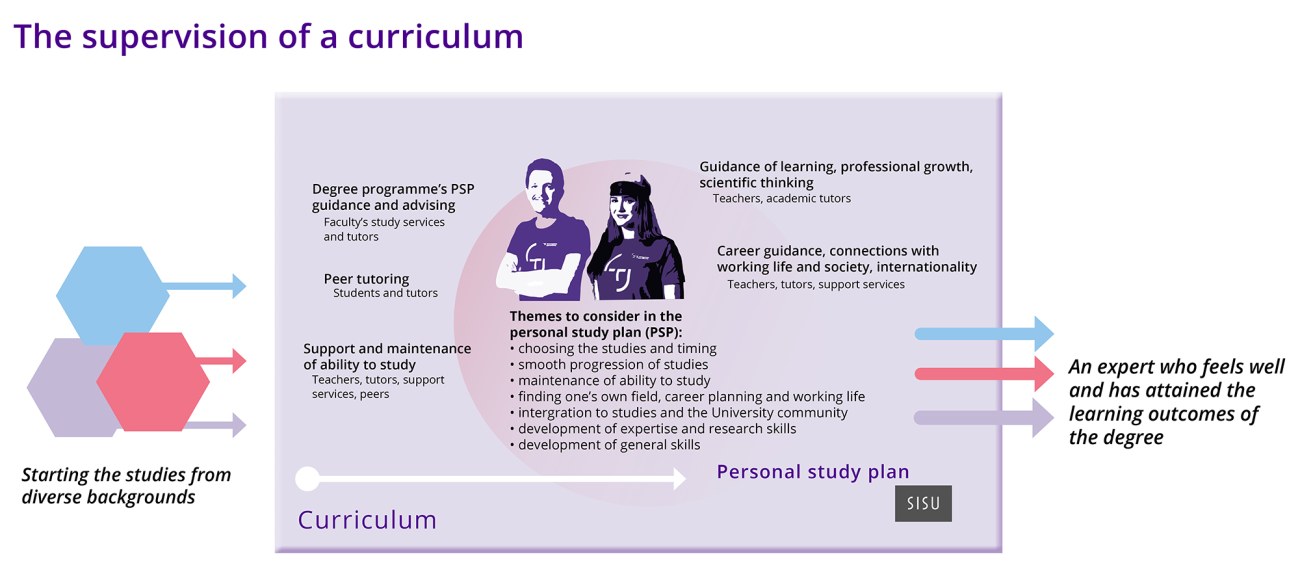Personal study plan (PSP)
Study planning is a central and necessary part of university studies. The Universities Act, Tampere University’s Regulations on Degrees and the curriculum define the boundary conditions concerning the content and scope of your degree. Within these frameworks, you will be able to make choices based on your interests, goals and life situation at the different phases of your studies. Study planning helps you visualise your studies, facilitates following up on your studies and supports building your knowledge and expertise.
This page contains degree programme/Faculty-specific instructions on the PSP processes that concern you.
What is PSP?
PSP, or the Personal Study Plan, is a tool to help you plan your studies and develop your expertise. During the PSP process, you reflect and assess your short- and long-term goals, learning, your life as a student, and career orientation. In the PSP process, you think about the capacities that you already have and define your goals as well as a schedule for reaching those goals.
The PSP process also makes you commit to the goal-oriented achievement of your goals and enables you to assess and follow up on your learning and progress in studies.

A central part of the PSP process is a study plan made on the Sisu study information system. Your PSP made on Sisu is basically approved if it meets the requirements of the curriculum. In some situations, the content of a study unit is set to be approved separately, or if you edit the content of a study unit in the free design mode, you must have it approved separately.
Drafting and updating the PSP – the goal defines design
Drafting a PSP is based on your knowledge of the curriculum in your degree programme. The starting point is also to contemplate and crystallise your personal goals. When drafting the plan, it is important to ensure that it supports the smooth progress of your studies and your well-being. In the electronic curriculum, you describe the study modules needed to complete the degree, the study units, the order of taking the studies and the schedule.
Tips on drafting and updating a PSP
- Get acquainted with the curriculum of your degree programme. Check which parts your degree is comprised of, what kind of choices you can or should do, and how your knowledge will build during your studies.
- Do you have previous knowledge or skills which you recognise and want to make part of your degree? Get familiar with the study unit or study module-specific opportunities to accredit prior learning. The teacher of the study unit or the study administrator of your degree programme provide further information.
- Check out and prepare for the schedule of making study-related choices. Lead your own study path!
- Learn about exchange studies and internship opportunities in Finland and internationally. Think about how you can benefit from such options during your studies.
- At the very least, it is possible to integrate the internationalisation study module in each degree. Which studies do you want to take?
- On the Sisu study information system, you draft your personal study plan (PSP), sign up for courses, and monitor the progress of your studies.
- Through the curricula, you can more easily get acquainted with the course catalogue of the entire university. In the curricula, you can filter our course offerings and modules in the way you want. Read instructions how to use the curricula
- Student’s Guide offers you information and guidelines on your studies. The Guide also contains instructions on how to use Sisu.
Your PSP is updated and specified during the studies
As a student, you need to evaluate and update your study plan regularly as your studies progress and as is needed when your plans evolve and change. The PSP follows you and develops throughout your studies as a tool that supports study planning, study-related choices and the overall management of your studies. At the same time, it gives you the opportunity to examine the accumulation of your learning, skills and expertise as well as the development of your career orientation.
A credit corresponds to about 27 hours of work – the annual goal is 60 credits
The extent of University studies is expressed as credits. The number of credits is defined based on how much work the studies require. A credit is a calculation tool, which requires on average 27 hours of work from the student. This may include, for example, contact or online teaching and independent work. The necessary amount of work may vary considerably according to the student’s study skills and opportunities.
As full-time study, the average 1,600 hours of work required to complete one academic year of studies corresponds to 60 credits.
How is study planning supported?
As a student, you are responsible for planning your own studies and developing your skills, drafting, updating and using your PSP in your daily studies, and making study-related choices. Many kinds of support are available for doing this:
- In orientation at the beginning of your studies, you get familiar with your degree structure and how to do your PSP.
- You are supervised in the PSP process and making a study plan by, among others, the personnel of your Faculty and your academic tutor.
- You may participate in various events that present the elective study modules.
- Take part in company days and other events where you can reflect on your study goals also from the career perspective.
- When necessary, you can take advantage of other academic guidance and counselling services provided by the University eg to support your choices.